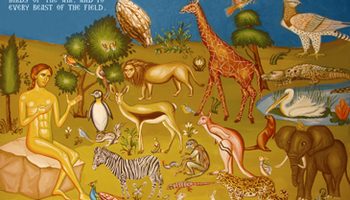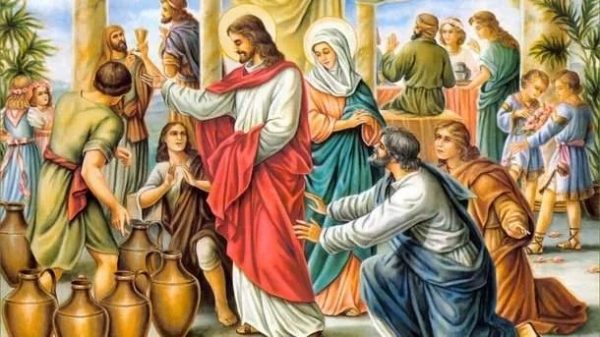While it has become a commonplace in modern rhetoric to minimize, or even deny, that Jesus himself had anything to say about sexual morality, this is simply not true. In answering a question regarding divorce in Matthew 19:3-12, Christ directs us back to the first two chapters of the book of Genesis in order to illustrate God’s plan for gender, sexuality, and marriage in his creation. By pointing to and reaffirming these passages, Christ in fact makes a strong statement which has consequences for the Christian understanding of issues as diverse as divorce, polygamy, and homosexuality. Understanding this teaching of Christ presents an additional hurdle, however, as the Genesis narratives to which he points have themselves been the subject of modern reinterpretation, and so a very close reading of those early texts is necessary.
In Genesis 2:7, God creates man from the dust of the earth. The word here in Hebrew is ‘adam’, from which we derive the name Adam. Adam is similar to the Hebrew ‘adamah’, which means ground or dirt. ‘Adam’ is also the word which refers to ‘humanity’, parallel to the Greek word ‘anthropos’. After Adam has been placed in Eden, the garden in which God himself dwells with him, a problem is described in Genesis 2:18. While God has called all of his creation thus far ‘good’, he says that it is not good that Adam is alone. This text represents the beginning of modern misinterpretation. It is not a statement that Adam is lonely. It is not a reference to his emotional or spiritual state in any way. In those senses, Adam is most certainly not alone, in that he lives continually in the presence of God himself, not to mention the angelic hosts who also dwell in the garden. Adam lacked nothing in regards to companionship, conversation, and fulfillment in his relationship to God. What was lacking becomes apparent when reading the preceding text. The plants all reproduced after their kinds. The seas and the skies teemed with life. The land animals reproduced after their kinds. Adam was alone. God is the one who gives life to the world, and in abundance. Adam was alone.

God’s solution to this problem is that he will make a helper who is suitable for Adam. God states this solution before the naming of the animals, so the latter does not present some sort of trial and error experiment. Rather, as Adam names the animals, he becomes aware of the problem as all of the animals exist in gendered pairs who reproduce, bringing new life into the world. He himself has been directed by God to serve in cultivating the garden, to assist in the bringing forth of life in the world (Gen 2:15), but he himself is not able to do so. The word which is generally here translated as ‘suitable’ or ‘fitting’ is the Hebrew ‘kenegdo’. This word contains the ideas of both ‘parallel’ and ‘opposite’. This helper will be someone who is like Adam, but who is also differentiated from him in a way that the two will fit together. This includes the anatomical level, but also goes beyond it to the emotional, spiritual, and personal level. The two will fit together, and bring new life into the world.
When God then sets out to fashion this helper for Adam, he does not simply create another human out of the earth who happens to be differently gendered. Rather, Adam is put into a deep sleep, like unto death. God then removes his side. While this is commonly translated ‘rib’ in English, this is the only place in the Hebrew Bible in which this word is translated ‘rib’. Everywhere else it refers to a side (and those dedicated to it being ‘rib’ here proceed to argue that all of those other uses are metaphorical references to a ‘rib’). The Greek word in the Septuagint likewise refers to a side, and is commonly used to describe the lateral sides of the thorax of an insect or crustacean in biology today. To state it more simply, God pulls Adam in two. He then ‘fills in’ the missing portion of Adam and builds out the side of Adam which he has taken into a woman. As Adam states upon awakening and seeing her, henceforth humanity (‘adam’) will exist as man and woman, in Hebrew ‘esh’ and ‘eshah’, male and female. This story is a more detailed telling of Genesis 1:27.
Genesis 2:24, then, is a summary of what has come before. It begins with ‘on account of this’, ‘for this reason’. What is about to be stated is a result of the reality of the manner of man and woman coming into being in this way. It is for this reason that a man shall leave his father and mother and cleave to his wife and the two shall become one flesh. It is because they both derive from one flesh that their marriage will represent a restoration, a coming back together, of humanity in one flesh. It is because a man possesses what is lacking in a woman, and a woman possesses what is lacking in a man that the two will come together as a single whole. And through this coming together, God’s desire to fill the earth with life will be fulfilled (Gen 5:1-2). It is this summary that Christ quotes to his questioners in Matthew 19:5, thereby endorsing this whole understanding.
By Christ’s affirmation of this, and his affirmation that this was his intent from the beginning, he condemns all forms of polygamy as sin. Not only multiple simultaneous marriages, but multiple sequential marriages, as he directly states (Matt 19:9). This also affirms that the purpose of sexuality is the uniting of two as one flesh within marriage, and the production of new life, and therefore not the gratification of fleshly desires. This means that all forms of sexual gratification pursued outside of the bond of marriage to a single spouse are sin. This means that all forms of sexual gratification which do not have the possibility of producing life, including but not limited to homosexual practice, are sin. God has placed marriage, and human sexuality within it, as a beautiful gift in the world and a source of life. If someone intends rather to distort and twist these things in order to please themselves. Sexuality so distorted then becomes a source of death, rather than of life. It is for this reason that Christ says that it is better to be a “eunuch”, and to sacrifice this element of life entirely, than to be destroyed by it (Matt 19:11-12, compare Matt 18:8-9).
















